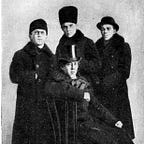The Criticism of Criticism: By The Grace of God
Not too many blessed with this corner vision
Don’t give them knowledge, give them more religion, poor decisions
- Ransom
One must … also make available the signs of the blessed vision for the next generation.
- Proclus
You ni88as ass-backwards tryna understand, first start with knowledge
- Rome Streetz
At the turn of the 20th century, neuroticism reached it’s pinnacle.
Many stars have seen festers of neurotics throughout human history. Even before we were humans, the neuroticism was there.
The form it has taken now is one of self-awareness, or rather self-pretension. Prior to the 20th century, the mirror had not been built, the dimension had not been investigated.
There were glimpses of the self-pretension in psychoanalysis. A formalization of folk-psychology. Before psychoanalysis and psychology, we had psychological terms and referred to people that were mentally different as being somehow under an influence that “normal” weren’t.
If someone was smart, they may have been blessed by God. If someone couldn’t hear, their mental state was understood as such and such.
After the 1700s, it was getting more and more “normal” to not use God as a reference point. The metrics evolved to inherent functions of the universe.
The human body became like a running clock inherent with power from a powerful, power-producing universe.
How do we tell the time? It’s partly an intellectual endeavor involving the understanding of time keeping and it’s partly a political endeavor where power is established by accepting what constitutes a time. “It’s time to eat pizza.”
In the process of saying “it’s time to eat pizza,” power is established.
It’s important to understand that this is critical (no pun intended) to the process of existing. Meaning that criticism of the process towards establishing power is intrinsic to autonomy.
This could be understood as criticism being an evolutionary tool that validated us as fit enough to survive. At this point, we’ve had this tool long enough that we can talk about it in a “mature” way
We understand that along with perpetual existence, as long as co-exist with this, we exist as a conduit of criticism. If we were disembodied but lived forever, part of the eternal would be being critical (pun intended).
Psychoanalysis almost established a mirror toward neuroticism, but it missed the mark because it didn’t take itself into consideration (own personal bias).
By the era of WW2, however, a number of intellectuals, bearing the power of hopelessness, were ready to abandon any dogma. The resulting barebone reality was a machine, a cold, heartless machine, whose only humanity was found in criticism. The believes we find warmth in, the delusions we keep faith in were powerless in this world.
But irritating criticism found responses from the Nazi beasts.
These intellectual asked us to criticize criticism.
Within the criticism, we find the ego. If we choose to investigate it.
We can look away, criticize the Other. Only, after the atrocities of WW2, we know an axiom that we live inside the criticism. And if we don’t see ourselves in it, it’s because we deny staring at ourselves in the post-WW2 mirror. We choose to continue the war. Like sore loser confederates in the South.
